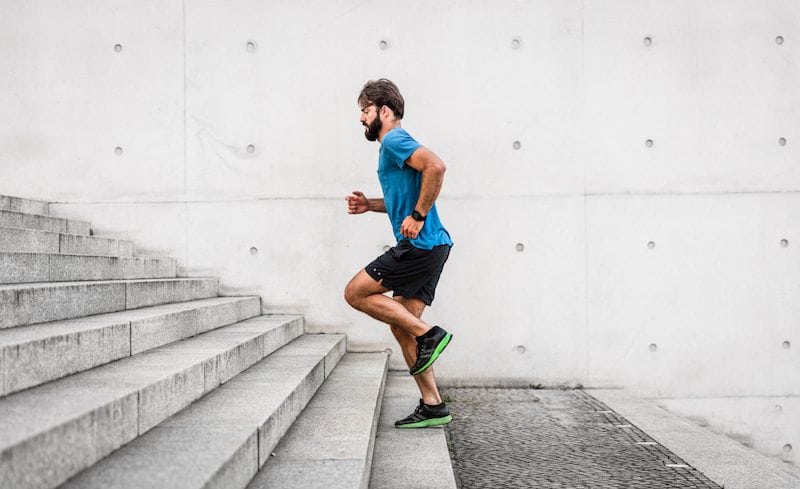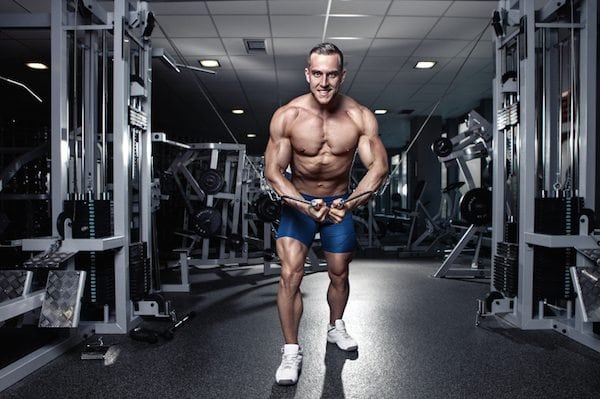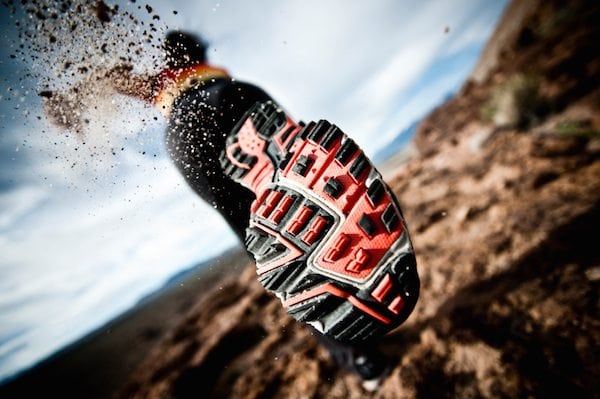No products in the cart.
Will Running Help Build Muscle or Will it Hurt Your Gains?

Running is one of the most common exercises in the world. When your out of shape friend decides that he wants to lose weight, he takes up running.
There are hundreds of benefits to adding cardio to your training, but is muscle gain one of them?
Most lifters will tell you that running will destroy your gains, that it is the only thing worse than not immediately having a protein shake after a workout.
They’ll then tell you to eat some tilapia as it thins out your skin … The thing is, that if running does ruin your gains why do bodybuilders add cardio to their routine? Why are rugby players or American Footballers still massive?
Clearly this is a complicated debate, with a lot of grey areas. In this article we will attempt to decipher whether adding running to your routine will help you build muscle, ruin your muscle building gains, or have no effect whatsoever. [toc]
Short Term Benefits of Cardio on Hypertrophy

A study in 2014 by Konopka & Harber found that aerobic exercise can increase skeletal muscle hypertrophy (muscle growth) by altering protein metabolism [1].
This demonstrates that running can help build muscle. Case closed right? Well this study does come with a “but”.
While there was a statistically significant increase in muscle size, it was in untrained people (not lifters) and it was only over a 12 week period.
What this study demonstrates is that an untrained person who took up running or other aerobic exercises (cycling, swimming etc) would see a small but noticeable difference in muscle size.
When you think about it this isn’t too crazy an idea. Running involves moving your legs repetitively while carrying your body weight. Swimming involves you dragging your body through water, cycling involves your legs pedalling to generate momentum.
But if you are thinking that a cardio based exercise is going to get you bodybuilder sized muscles then you should keep on dreaming.
Anyone who has been training for a few months will see minimal changes in their physique. Which is why you rarely see marathon runners who are also bodybuilders.
But if you were looking to increase the muscle mass of a 70 year old man who had been house bound for a decade aerobic exercise would be a great shout.
Another thing that you should be aware of, low impact cardio (brisk walks etc) will have much less impact on muscle size than high intensity interval training.
The higher the intensity, the better the hypertrophic gains. Intensity is relative of course, what Usain Bolt would find to be a slow jog would be incredibly intense for an 80 year old woman … or any of us!
Concurrent Training

If you’ve ever completed a weight training circuit or a Crossfit class you’ve probably experienced the effects of concurrent training. This is where you combine cardio and weight training.
It doesn’t have to be in that circuit-based environment, it could be as simple as a chest workout followed by 30 minutes on an exercise bike.
The combination of cardio and weights is one of the most effective fat burning routines that there is.
But if your goal is hypertrophy then concurrent training is not for you.
While we mentioned how aerobic training could improve muscle mass in sedentary people, it is nowhere near as effective as weight training.
If it was a choice between cardio and weights, you’d pick weights every single time!
So while cardio is great for fat burning, weight training is best for muscle gain.
A training session that was 100% weight based would be more effective than a session that was 60% weights 40% cardio.
You can lift weights and run, but splitting them into separate sessions is advisable. Remember that weight lifting itself is a form of cardio!
Does Running Catabolise Muscle?

One of the most persistent myths in bodybuilding is that not only is running bad for hypertrophy it actually reverses it.
The idea being that if you ran 10km you’d actually lose muscle. Now there is some science behind this, exercise does increase cortisol production.
While this has many benefits it can affect muscle tissue.
If you were to exercise for hours on end with poor nutrition then you could potentially lose some muscle.
But if you let that happen you’d be pretty bad at bodybuilding.
Numerous studies have shown that adequate protein intake can prevent muscle catabolism, and protect your gains.
Also, if you are training to increase muscle size while simultaneously training for ultra-marathons then you’ve probably taken on too much and should assess your goals.
Finally, it’s not just running that can massively increase cortisol production. It’s any form of exercise.
Those 4 hour weight training sessions that your favourite bodybuilder does? Without steroids that workout would also lead to muscle catabolism. It’s the reason why natural bodybuilders cannot ever get as big as an enhanced bodybuilder.
Final Thoughts

If you are brand new to training you could definitely get away with concurrent training, you’d get the fat loss benefits while still building muscle.
The longer you train the less beneficial cardio will be to your muscle building goals (though it will be amazing for your fat loss goals).
That doesn’t mean that you need to stop doing it, if you enjoy running and want to use it to improve your calorie deficit/maintenance then you can still run. Just schedule it for a different day to your weight training.
Running clearly has no negative effects on boxers, footballers, rugby players, or Crossfitters.
It is perfectly possible to get bigger while still running you just need to manage your program.
Make sure that your recovery is on point and that you are consuming enough protein. But don’t feel that you HAVE to run if you don’t want to. It’s not necessary if your goal is muscle gain.
